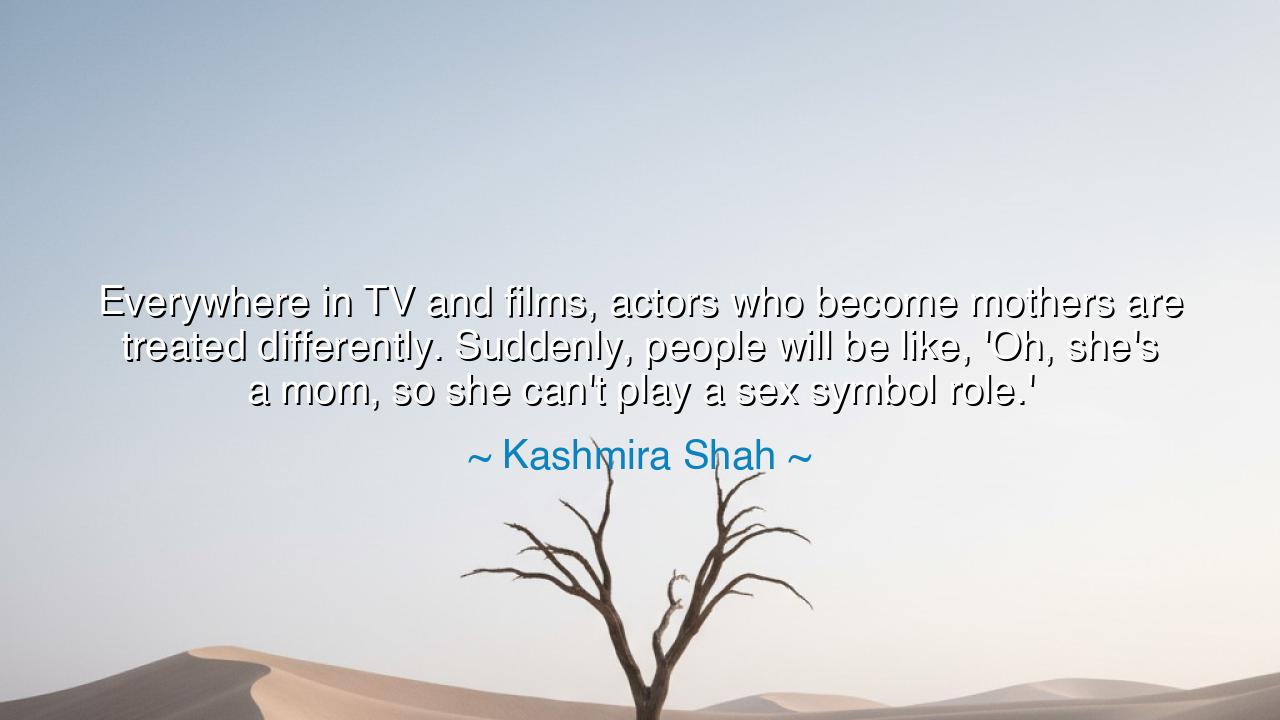
Everywhere in TV and films, actors who become mothers are treated
Everywhere in TV and films, actors who become mothers are treated differently. Suddenly, people will be like, 'Oh, she's a mom, so she can't play a sex symbol role.'






When Kashmira Shah said, “Everywhere in TV and films, actors who become mothers are treated differently. Suddenly, people will be like, ‘Oh, she's a mom, so she can't play a sex symbol role,’” she spoke not just of her own experience, but of a larger injustice — the world’s tendency to confine women within the narrow boundaries of expectation. Her words unveil an ancient struggle in a modern disguise: the battle for a woman’s right to exist in her fullness — as creator and lover, nurturer and artist, mother and muse. What she laments is not simply bias within an industry, but the enduring myth that motherhood diminishes, rather than deepens, a woman’s power.
From the beginning of civilization, societies have exalted the mother as sacred and then bound her in chains of limitation. In myth and history alike, we see the dual image — the goddess of fertility revered, yet forbidden to be free. The Greeks worshiped Demeter, the mother of harvest, yet when her daughter Persephone was taken, the world saw her grief, not her might. In her suffering, the ancients glimpsed power, but they never celebrated her sensuality, her fire. In the same way, Kashmira’s words point to a world that praises motherhood in theory, yet punishes the mother for her humanity — as if the act of giving life should strip her of the right to embody desire, mystery, or beauty.
The entertainment industry merely mirrors what lies within the human psyche: a fear of contradiction, a discomfort with complexity. Society prefers simplicity — the maiden, the mother, or the muse — but not all three in one. Yet history tells us that the greatest women have always transcended such divisions. Consider Cleopatra, queen of Egypt — mother of children, ruler of empires, and symbol of sensual power. The world called her seductive, but her allure was not born of vanity; it came from intelligence, charisma, and command. She shattered the idea that a woman’s maternal role diminishes her magnetism. In her, the sacred and the sensual were one.
What Kashmira reveals through her words is the hypocrisy of perception — that when a man becomes a father, he is seen as more complete, more respectable, more desirable. But when a woman becomes a mother, the world demands modesty, silence, and surrender of identity. The fire that once made her luminous is now called inappropriate, as though love for her child and love for her body cannot coexist. Yet both are expressions of the same divine force — creation. The mother gives birth not only to life but to art, to beauty, to wisdom. To tell her that she cannot play the “sex symbol” is to deny the fullness of her being.
Her statement, therefore, is a call to reclaim wholeness. For too long, women in art — and beyond it — have been divided into categories that diminish them. Kashmira’s truth urges us to remember that motherhood is not a diminishment of self, but an expansion. The artist who is a mother carries within her a deeper well of emotion, a broader range of empathy, a greater understanding of the human condition. The sensual and the maternal are not opposites; they are reflections of the same sacred energy that sustains life and art alike.
History offers many examples of this truth. Sophia Loren, the Italian actress and mother, was told her allure would fade with time and family. Instead, she grew more radiant — not despite motherhood, but because of it. Her confidence became gentler, her beauty more profound, her performances richer with depth. Loren once said, “Everything you see, I owe to spaghetti,” a playful quip hiding a deeper message: that the woman who lives fully — who loves, eats, bears children, and still dares to dream — is unstoppable. Kashmira’s quote stands in the same spirit of defiance, reminding us that womanhood cannot be fragmented to fit the comfort of others.
Thus, let this be the lesson for future generations: never allow the world to reduce you to one title, one image, one role. Whether in art, in work, or in life, hold fiercely to your complexity. Be mother and muse, warrior and dreamer, sacred and sensual — all at once. For the divine feminine was never meant to be divided. When you are told that one part of you must silence the other, remember Kashmira’s words and stand tall in your truth.
For a woman who embraces every part of herself — her motherhood, her artistry, her desire — is like a flame that cannot be contained. The world may try to dim it, to name it, to limit it, but still it burns, eternal and defiant, lighting the path for all who come after her.






AAdministratorAdministrator
Welcome, honored guests. Please leave a comment, we will respond soon